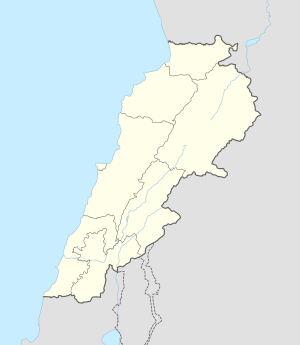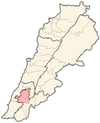Jibshit, Nabatieh
Jibshit
جبشيت | |
|---|---|
Municipality | |
| Coordinates: 33°21′50″N 35°25′48″E / 33.36389°N 35.43000°E | |
| Grid position | 121/159 L |
| Country | |
| Governorate | Nabatieh Governorate |
| District | Nabatieh District |
| Time zone | UTC+2 (EET) |
| • Summer (DST) | +3 |
Jibshit (Arabic: جبشيت) is a municipality in the Nabatieh Governorate region of southern Lebanon located north of the Litani River.
History
[edit]In 1596, it was named as a village, Jibsid, in the Ottoman nahiya (subdistrict) of Sagif under the liwa' (district) of Safad, with a population of 39 households and 10 bachelors, all Muslim. The villagers paid a fixed tax-rate of 25% on agricultural products, such as wheat, barley, olive trees, fruit trees, goats, beehives and "Occasional revenues"; a total of 5,040 akçe.[1][2]
In 1875 Victor Guérin found here a village of 400 Metualis, and a Wali, named Nabi Seth.[3]
On the night of 27/28 July 1989 Israeli commandos abducted the Hizbullah leader Sheikh Abdel Karim Obeid and two of his aides from his home in Jibshit. The operation was planned by the then Minister of Defence Yitzhak Rabin. Hizbullah responded by announcing the execution of Colonel Higgins a senior American officer working with UNIFIL who had been kidnapped in February 1988.[4]
In 1993, during a week-long attack by Israel on Lebanon; "an Israeli Army spokesperson said that "70 percent of the village of Jibshit is totally destroyed, its inhabitants will not recognize it." The goal is "to wipe the villages from the face of the earth," a senior officer added."[5]
Demographics
[edit]In 2014 Muslims made up 99.76% of registered voters in Jibshit. 99.05% of the voters were Shiite Muslims.[6]
See also
[edit]References
[edit]- ^ Hütteroth and Abdulfattah, 1977, p. 184
- ^ Note that Rhode, 1979, p. 6 Archived 2016-10-10 at the Wayback Machine writes that the register that Hütteroth and Abdulfattah studied was not from 1595/6, but from 1548/9
- ^ Guérin, 1880, p. 527
- ^ Middle East International No 356, 4 August 1989, Publishers Lord Mayhew, Dennis Walters MP; Jim Muir pp.3,4; Peretz Kidron p.5
- ^ Noam Chomsky, "Limited War" in Lebanon, orig. published in Z Magazine, September, 1993
- ^ https://lub-anan.com/المحافظات/النبطية/النبطية/جبشيت/المذاهب/
Bibliography
[edit]- Guérin, V. (1880). Description Géographique Historique et Archéologique de la Palestine (in French). Vol. 3: Galilee, pt. 2. Paris: L'Imprimerie Nationale.
- Hütteroth, W.-D.; Abdulfattah, K. (1977). Historical Geography of Palestine, Transjordan and Southern Syria in the Late 16th Century. Erlanger Geographische Arbeiten, Sonderband 5. Erlangen, Germany: Vorstand der Fränkischen Geographischen Gesellschaft. ISBN 3-920405-41-2.
- Rhode, H. (1979). Administration and Population of the Sancak of Safed in the Sixteenth Century (PhD). Columbia University. Archived from the original on 2016-10-10. Retrieved 2017-12-04.
External links
[edit]- Official Website : www.jebchit.com
- Jibchit, Localiban


